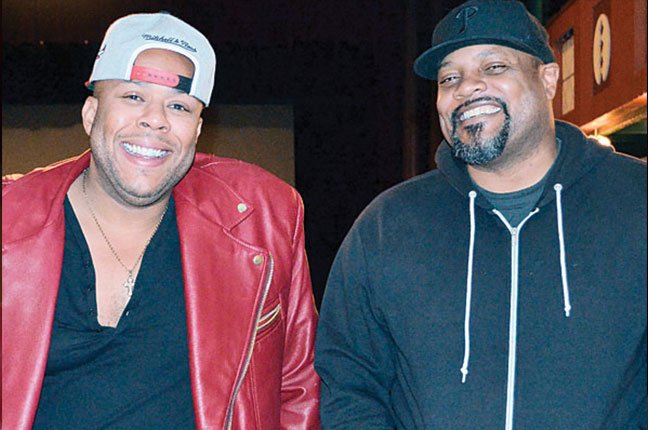Dice Raw raps for prison reform
Karl Jenkins - also known as hip-hot artist Dice Raw - is standing onstage at the Freedom Theatre as a whirlwind of activity goes on around him.
Dice Raw and Rennie Harris on stage at Freedom TheatrePhoto.
by By A.D. Amorosi, For The Inquirer
Karl Jenkins - also known as hip-hot artist Dice Raw - is standing onstage at the Freedom Theatre as a whirlwind of activity goes on around him.
Dancers and actors are to the left as choreographer Rennie Harris busies himself with legwork. Director Ozzie Jones is stage right, consulting writer Phillip S. Brown's script.
As Dice Raw, Jenkins deals with this kind of maelstrom regularly. He's the rapping wingman for the Roots and holds down a solo career in hip-hop. But with the 2013 release of the album Jimmy's Back, Raw opened a powder keg of anti-prison rhetoric, one set to explode onstage Friday and Saturday at Freedom, when his performance art/hip-hop musical/dance presentation The Last Jimmy debuts at the North Philadelphia venue.
The show is a call to action against a penal system that imprisons the poor and the disenfranchised at an alarming rate, focusing on petty hoods rather than violent criminals. "People get arrested for a couple dollars worth of cocaine and go to prison," Jenkins says. "The police and the courts are being distracted by cats in the trees when we have real issues."
It's "a theatrical protest piece with me in the middle," says Raw, who not only wrote the show's music and lyrics, but acts in it, as well. "Calling it a hip-hop musical makes it palatable, simplifies the experience," he says. "There's rapping, singing, and a live band, but there's more to it than that."
That thesis isn't one Raw just happened upon. Jimmy's Back and its theatrical adaptation, The Last Jimmy, are based on the lives of two childhood friends. The first is the work's namesake, Jimmy Davis, Jenkins' pal from Frankford High, better known as MC/producer Jimme Wallstreet, fatally shot in June 2013. "There are guys in prison for a nickel bag of weed, but those who murdered Jimmy have not yet been brought to justice," Raw says. Then there's his buddy Wal-Lo - from the late, great Philadelphia rap group Major Figgas - who has been in jail for 22 of his 35 years. Wal-Lo has never had a girlfriend, driver's license, or his own apartment.
"We're tight, as close as Black Thought and I," says Raw, comparing Wal-Lo to the Roots' front man. "But our interaction is from behind bars. Look, he's paid his debt to society in my estimation. It wasn't as if he committed a murder, or any violent crime - it was robbery, but because he's been in prison before, he's viewed as a career criminal. His time keeps getting extended based on prior convictions."
Raw knows that crime exists and that people should be punished. To him, society needs to make a judgment call, perhaps a vote beyond the role of judges and juries, that takes into account one's rehabilitation during incarceration. "There has to be a different way of evaluating time in jail. Too many people, mostly poor blacks, Latinos, and whites, fall between the cracks and are forgotten."
He can spout figures. He has issued a publicity release declaring: "For African American males in their thirties, 1 in every 10 is in prison or jail on any given day. Two-thirds of those in prison for drug offenses are people of color, and approximately half of all Americans incarcerated are for nonviolent offenses." He is heading action demanding Congress support the federal Smarter Sentencing Act, which would reform sentencing guidelines. This dedication to cause, to say nothing of the Raw power of Jimmy's Back, caught the attention of director Jones and author Brown, who began working on a theatrical framework for the album's conceits. Raw involved choreographer Harris' Puremovement hip-hop dance troupe for a sense of constant motion to go with the live score's 20 songs, some from Jimmy's Back, others from his forthcoming album, Green Cotton Ham.
"My talented friends understand how the gangster narrative often drowns out other forms of black expression," Raw says of his collaborators. "It's our duty to show how we feel." As for going from the hip-hop stage to the acting stage, Raw says with a laugh, "Theater's way more organized and very serious business. I can't swig from a champagne bottle, and there's definitely no smoking in the Freedom Theatre."
Save for wanting to smoke, Raw's a good guy ("no angel, but I have no record") who gets the irony of growing up within the confines of the law yet fighting for the rights of the incarcerated.
"If not me, who? The victimized need a voice as well as an outlet," he says. "And, look, I see a cop car behind me and I get nervous. I just feel it. The last time I got stopped in Jersey, I was pulled over for not keeping my wheel straight, and now I have a warrant for my arrest. I did nothing, but you can't hide from the system."

